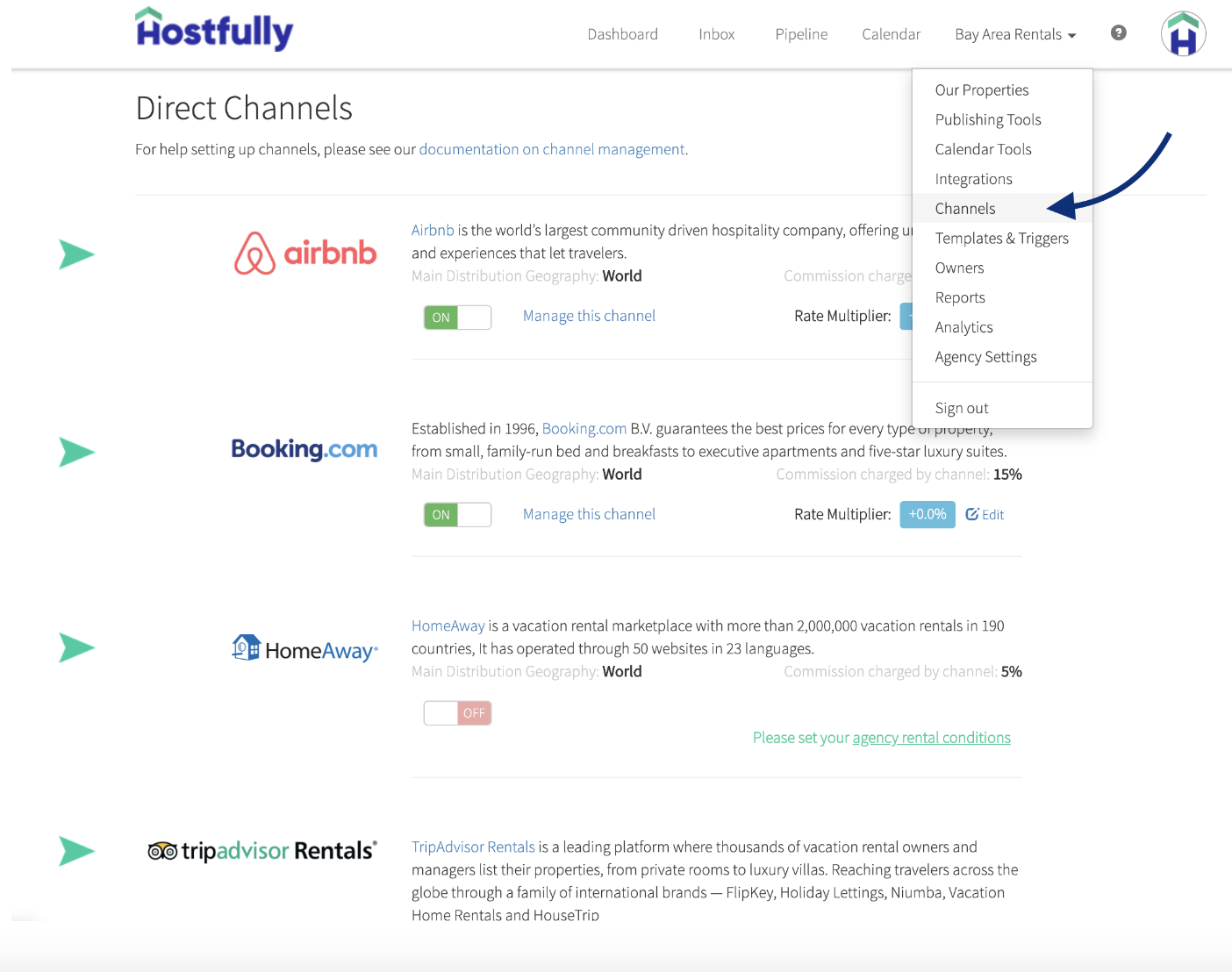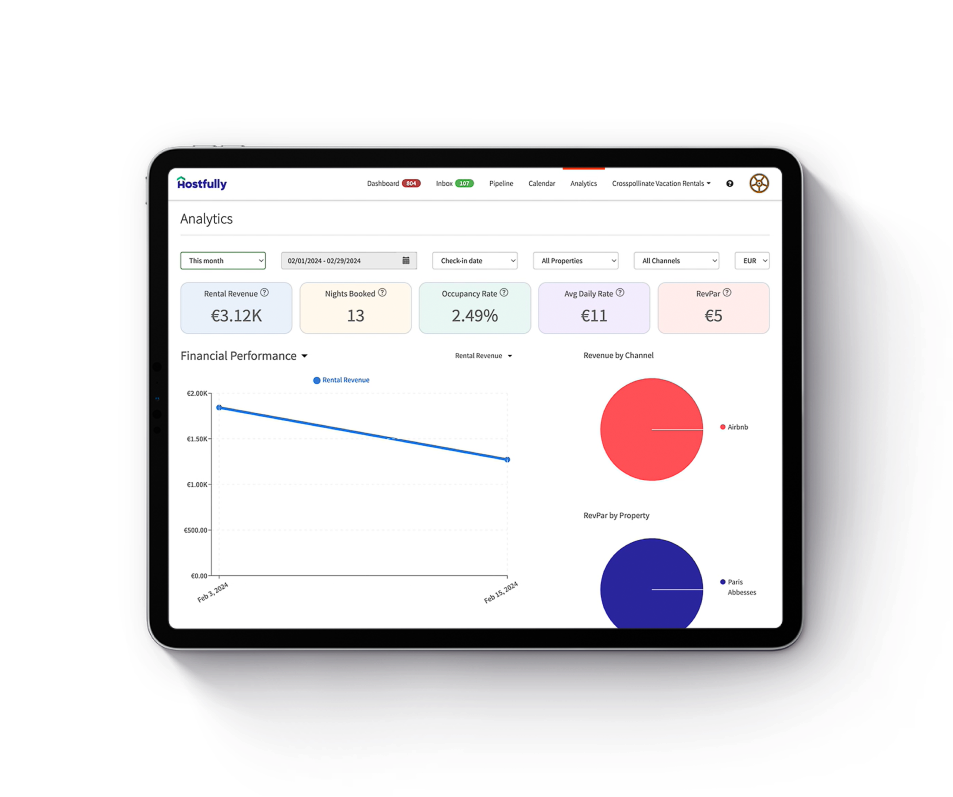Listing across multiple platforms can dramatically increase your earning potential, according to the latest AirDNA research. You can reach new markets and expand your customer base. And when you don’t rely on one partnership, you protect yourself from risks like outages, sudden algorithmic shifts, and unfavorable policy updates.
But managing multiple providers is easier said than done. Juggling listings, calendars, and pricing is overwhelming and can lead even the most thorough operators to double-book their properties.
What you need when you first start listing across platforms is a robust channel management strategy. This ensures you have the right tools and resources to manage all the sites and established processes for the entire team to follow.
Our guide covers some of the essential channel management strategies for short-term rental companies of all sizes. We include tips from business owners, Andrew Llewellyn and Christian Suzon, so you can see what industry veterans have found actually works.
Why vacation rental owners need a channel management strategy
Channel management is a complex task. A comprehensive strategy lets you reap the benefits of listing across different channels while keeping operations simple. It keeps data centralized, helps you allocate resources wisely, and gives your team a repeatable process to follow.
What’s more, a channel management strategy prevents you from making costly mistakes. There’s a much lower risk of double bookings, which can lead to penalties and platform suspensions and bans. For example, Vrbo can charge you up to 50% of the reservation total for the nights not stayed for cancelling over these mistakes.
Some hosts may be happy to continue leaning on one or two listings to keep their operations simple. Hostfully’s latest report suggests this approach is a bad idea. We’ve found that the average ratio of bookings coming from Airbnb has dipped significantly over the past five years as alternatives have become more popular.
Christian Suzon, owner of Hometime, adds that big platforms can’t always help you find your target customers. “While Airbnb is the largest STR distributor in the market, we discovered that listing on other channels allowed us to target new geographic regions and audience demographics. After all, different travelers search for accommodations on different platforms, so listing our properties on other distribution channels allowed us to broaden our reach.”
9 strategies for better channel management for vacation rentals
Strong channel management doesn’t come down to a single process. Many serious short-term rental operators rely on various methods to keep systems organized while expanding their reach.
In this section, let’s explore some of the most effective strategies for businesses of any kind and size.
1. Start simple and scale
Establish simple processes to sync calendars and manage guest communications. As you list across more platforms and add properties to your portfolio, you can build on these. This avoids you getting overwhelmed with intermediaries, tools, and complex workflows when you’re only managing one or two channels.
For example, suppose you only list one property on Airbnb and Vrbo. Start by syncing the calendars across these and setting up some basic automation workflows before you introduce complex pricing rules or sales strategies.
2. Find the right channels
Pick the types of channels that match your needs and business goals rather than trying to be everywhere. Anything that doesn’t fit into your ecosystem only raises your monthly costs and adds unnecessary complexity to your channel management.
For example, Andrew Llewellyn, owner of Super Stays says they base every decision around net revenue per stay and lifetime value. If you’re unfamiliar with these metrics, it means he estimates the profit of every booking and how much value he can expect a channel to bring over time.
Suzon, on the other hand, prioritizes platforms that integrate directly with his property management software (PMS) and have a large following and market share in Australia. “Alongside Airbnb, we chose to list on Vrbo and Booking.com due to the aforementioned factors,” he says, “One significant factor that came into play was that these two platforms also share your listing on other OTAs like Agoda, Kayak, Expedia, Stayz, and more.”
3. Sync calendars and reservation data in real-time
Once you’ve decided where to list, your next step is to invest in a vacation rental channel manager. This software shares any information about bookings made through partner portals with all your other platforms to keep your availability up to date.
Don’t wait to get a channel manager until you’ve started noticing errors. As Suzon says, “When listing on multiple STR channels, one of the easiest mistakes to make is not syncing calendars across booking platforms, which leads to double-bookings and unhappy guests.” Even if you find them another property, this bad customer experience can lead to negative ratings and reviews, which can take months to recover from.
Curious about the difference between a PMS and a channel manager? While many companies like Hostfully combine both modules into one platform, they serve different functions. A PMS streamlines your internal operations, such as bookings, guest messaging, and check-in, whereas a channel manager shares information with your entire channel partner network.

4. Standardize and optimize listings
Keep listings consistent across channels while optimizing them for each platform’s rules, features, and user bases.
Sound a little paradoxical? By standardizing information, we mean ensuring key details about your property and processes are consistent across channel partners. For instance, customer satisfaction will dip if people book your vacation rental on Airbnb and discover the nightly rate is 20% lower on Vrbo.
At the same time, bear in mind what you need to follow the rules and stand out on each individual platform. If you list on Vrbo, for example, your photographs and descriptions need to be 100% original to be approved. You can’t copy them verbatim from Airbnb and Booking.com.
Llewellyn says his company made the mistake of using the same channel marketing strategy everywhere early on. His fix was to rewrite every headline and first paragraph to answer the two things each audience cares about. “Average review score climbed, refund requests dropped by year-over-year,” he says, “Plus we got a lot fewer messages about unmet expectations from guests.”
5. Familiarize yourself with all platform rules and guidelines
Learn each listing site’s rules and guidelines and incorporate these requirements into your processes. This minimizes the risk of you confusing one platform for another and accidentally violating policies, resulting in penalties.
Some common differences between platforms include:
- What property information is required on listings
- Which new products, services, and offers you can provide
- How far ahead guests can cancel and still receive refunds
- Where to handle guest communications
- How to handle issues like disputes, no-shows, and damage
What’s more, rules and guidelines for listing sites can differ across locations. But the good news is that popular platforms like Airbnb and Vrbo usually nudge you to obtain licensing and collect fees like transient occupancy tax on your behalf.
6. Understand and prepare for seasonal demand
Use dynamic pricing tools to adjust prices on demand, seasonality, and nearby competitors. This saves you from manually updating rates across all your channels, saving you a significant amount of time and eliminating the risk of human error.
These tools integrate with both your PMS and your channel manager to automatically make changes. They work by analyzing vast volumes of data and applying the most optimal rates to your listings.
As dynamic pricing tools process current market data, they can adjust pricing in real-time. This ensures you’re always one step ahead of sudden events that can affect demand, like bad weather and airline strikes. You can always override the tool’s decision whenever necessary, too.
7. Track performance across channels
Monitor key metrics across channels so you see what’s delivering you the best results. This gives you an opportunity to refine your listing strategies, double down on what’s working, and potentially drop some channels from your mix.
Here are the metrics to watch to help make data-driven decisions:
- Revenue per channel
- Occupancy rate
- Average nightly rate
- Cancellation rate
- Guest reviews and ratings
Use a PMS like Hostfully to track these metrics automatically. Our analytics dashboard gives you a big picture look or lets you dive deeper into individual channel performance. You can also filter by date and property to get more specific insights.

8. Consolidate guest messaging
Manage communication in one place to improve response times and avoid missing messages altogether. You can use a unified inbox like Hostfully’s to achieve this.
Our unified inbox works by syncing messages from across all the listing sites you use. No matter where a guest messages you from, it will appear on our platform. You can check for messages and respond to them in one place.
As a bonus, Hostfully’s inbox feature also enables you to automate some guest communication. You can create templates for different stages in the guest journey and set triggers so the software knows when to send them. And you can have our InboxAI reply to some messages using data from the conversation, your system, and your guidebooks — all that’s left for you to do is review and send.
9. Review and adjust your channel management strategy
Continuously refine your strategy to avoid getting left behind. The short-term rental industry is dynamic, and simple policy changes or market trends can make all your current processes redundant overnight.
As of January 2025, for example, Vrbo set a new rule stating that hosts must supply critical information to guests at least 72 hours in advance. The platform reserves the right to cancel your booking if they can’t source this information themselves or reach you on time. Missing updates like these could leave hosts thousands of dollars out of pocket.
Llewellyn suggests conducting weekly micro-updates to stay on top of changes. He says he makes a habit of “swapping the cover photo, tweaking the first 160 characters, or updating a seasonal amenity signals “active host,” which keeps us near the top of search.”
Common mistakes in channel management (and how to avoid them)
Good channel management is about avoiding bad practices as much as following the right strategies. Here’s what to avoid:
- Relying too heavily on popular platforms: Airbnb and Vrbo have a wide scope, but they might not serve your specific niche. Check out smaller alternatives to see if they cater to your target market and can help you expand your reach.
- Focusing on tiny details: Spending too much time tweaking descriptions and retaking photos can detract from other high-value tasks. Once you’ve found something that works, only revise it occasionally or when strictly needed.
- Overcomplicating pricing and rules: Too many house rules, cancellation policies, and pricing strategies can confuse you and lead to errors. Keep your processes as simple as possible.
- Using an inconsistent marketing strategy: While you should optimize for various platforms, ensure your marketing materials are consistent across them, your direct booking site, and your social media. Drastic differences in color schemes or tone of voice can make your business harder to recognize and look unprofessional.
- Neglecting local compliance: Never rely on platforms to help you follow short-term rental regulations. They may not incorporate new licensing conditions or taxes into their policies, leaving you at risk of legal troubles.
End channel conflict and double bookings with Hostfully
Effective channel management comes down to choosing the right platforms, understanding how to market your business across them, and building scalable processes. As time goes by, you can review and refine your approach.
The right tools take care of everything else. Hostfully’s channel management software syncs all your listings and reservation data across channels so you never get double bookings. Our PMS automates performance tracking, centralizes guest communications, and integrates with dynamic pricing tools to manage rates.
With clear processes and the right tools, channel management stops being an obstacle to scaling and profitability and becomes the foundation for growth.


